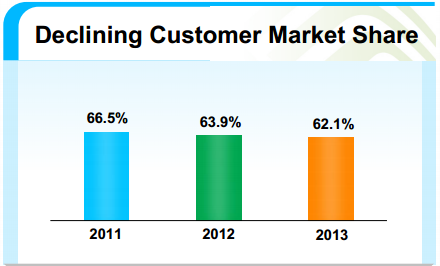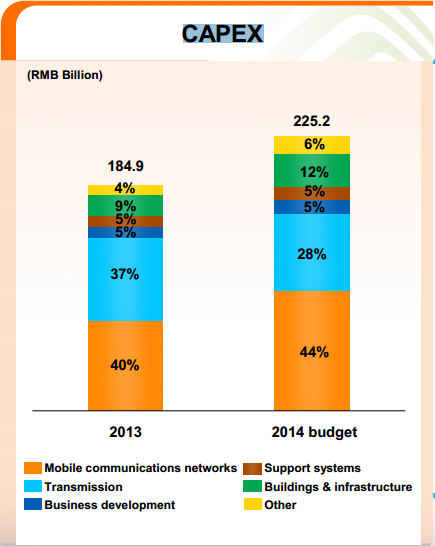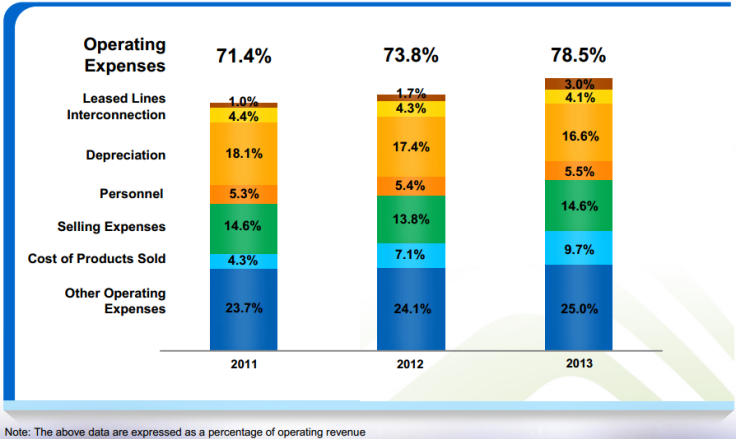Apple Inc. (AAPL) Deal, 4G Network Cost And Competition From WeChat Contribute To China Mobile's (CHL) Drop In Profit

China Mobile Ltd. (NYSE:CHL), the world’s largest mobile carrier, which became more familiar to Western investors recently as it made a deal with Apple Inc. (NASDAQ:AAPL), posted Thursday a 5.9 percent drop in net income to 121.69 billion yuan ($19.54 billion) in 2013, its first decline in annual earnings in more than a decade.
The company’s revenue rose a healthy 8.3 percent year-on-year to 630.18 billion yuan, and most of the drop in profit is due to rising expenses. Here are the four causes for the decline, and outlooks for 2014.
1. Belated introduction of Apple’s iPhones
Apple is the most desired smartphone brand in China, but its products were not available to China Mobile's 760 million subscribers in 2013. The Cupertino, Calif.-based company’s latest iPhone models, the 5S and 5C, became available in China shortly after they were announced in the U.S. last fall, through China Mobile’s competitors China Unicom Limited (NYSE:CHU) and China Telecom Corporation Limited (NYSE:CHA), and their availability lured some customers from China Mobile.
In fact, China Mobile’s customer market share has been on a steady decline since 2011. But now that it has reached an agreement with Apple and began carrying Apple phones in January, China’s largest mobile carrier should be able to stop losing customers to its competitors.

"We added 1.34 million new 4G users in February, and most of them are iPhone users,” China Mobile Chairman Xi Gouhua told The Wall Street Journal. “We are happy with the progress as we are still building our 4G network and the coverage is only available in some major cities.”
2. Shift to 4G network increases capital expenditure
Like its competitors, China Mobile committed enormous sums to build its TD-LTE network this year. The new 4G network contributed to a rise in capital spending to 184.9 billion yuan, a whopping 46 percent increase from 2012’s 127 billion yuan.
While the investment is necessary as more Chinese mobile users watch videos and play games instead of just making calls, China Mobile’s capital expenditure is likely to continue to rise in 2014 as upgrades and network expansion continue.
The company aims to have more than 500,000 base stations in 2014 from 200,000 now, and correspondingly capital expenditure is projected to grow to 225.2 billion yuan this year, with mobile communications network being an even larger chunk of the total expenditure than it was in 2013.

3. Higher operating expenses
In 2013, China Mobile’s operating expenses from personnel, depreciation, selling expenses and interconnection all stayed level. But cost of products sold went up, likely as a result of the deal with Apple and money the carrier spent purchasing Apple iPhones, which it will then subsidize in a bid to lure new high-end users into data plans.

“The company is having to spend a lot of money on handset subsidies to boost subscriber growth,” Ricky Lai, a Hong Kong-based analyst at Guotai Junan Securities, told Bloomberg.
“This is our first year with the iPhone, so we are increasing the level of spending on subsidies,” China Mobile’s CFO Xue Taohai said. “This will establish a good foundation for our long-term development.”
4. Competition from WeChat and other messaging apps
While revenue grew, competition with Tencent Holdings Ltd’s (HKG:0700) WeChat and other messaging apps weighed heavily on China Mobile in 2013. Revenue from traditional text messages dropped by 6.5 percent last year.
“We face challenges brought about by an accelerated substitution effect in the traditional communications business by Internet services,” Xi said in a statement. “We will push forward with the transition of business development from voice to data.”
© Copyright IBTimes 2024. All rights reserved.





















